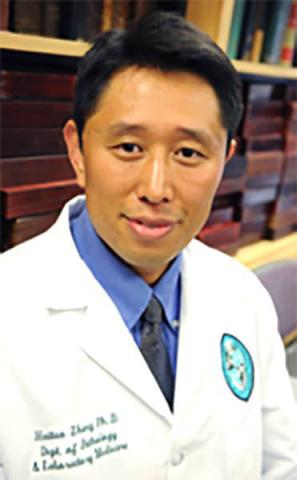Haitao Zhang, Ph.D.
Associate Professor, Tulane Cancer Center Member - Translational Oncology Research Program

Education & Affiliations
Biography
Dr. Zhang received his B.S. in molecular biology from the Nankai University, Tianjin, China, in 1992. He completed his doctoral training in the Department of Experimental Pathology at Roswell Park Cancer Institute, receiving his Ph.D. in 2000. Subsequently, he conducted postdoctoral research under the mentorship of Dr. Margot Ip, studying the mechanism of TNF alpha suppression of functional differentiation of mammary epithelial cells. From 2001 to 2003, Dr. Zhang worked at the Microarray and Genomics Core Facility at Roswell Park as a bioinformatics specialist. He was recruited to the Department of Cancer Chemoprevention at Roswell Park in 2003 as a research scientist and was promoted to research assistant professor in 2005. In 2008, he joined the faculty of Tulane University School of Medicine as a tenure-track assistant professor in the Department of Pathology and Laboratory Medicine, and was promoted to associate professor with tenure in 2014. Dr. Zhang’s research centers on targeting the androgen receptor signaling axis for the prevention and treatment of prostate cancer. He has severed on several DOD and NIH grant review panels.
Dr. Haitao Zhang, Associate Professor in the Department of Pathology and Laboratory Medicine at Tulane University School of Medicine, is an established investigator in translational research of prostate cancer. Dr. Zhang’s laboratory focuses on targeting the androgen receptor (AR) signaling axis in prostate cancer intervention. His lab has investigated the anticancer efficacies and mechanisms of several synthetic and natural compounds in prostate cancer. His recent search has established a role of AR splice variants (AR-Vs) in resistance to hormonal therapy and taxane-based chemotherapy in castration-resistant prostate cancer. Ongoing efforts in his lab include studies on the intracellular trafficking and the nuclear translocation of AR and its splice variants, and the impact of circadian disruption on stress response and therapeutic resistance in prostate cancer.
Faculty Appointments:
2008-present Assistant Professor, Dept. of Pathology and Laboratory Medicine, Tulane University School of
Medicine, Tulane Cancer Center, New Orleans, LA.
2005-2007 Assistant Professor, Dept. of Cancer Prevention and Control, Roswell Park Cancer Institute,
Buffalo, NY.
2005-present Member, National Cancer Institute (NCI) Cancer Center Support Grant (CCSG), Roswell Park
Cancer Institute.
2006-present Adjunct Professor, School of Medicine, Jilin University, Changchun, China.
2003-2005 Research Scientist, Division of Cancer Prevention and Population Sciences
Roswell Park Cancer Institute, Buffalo, New York
2001-2003 Bioinformatics Scientist, Microarray and Genomics Core Facility Roswell Park Cancer
Institute, Buffalo, New York.
2000-2001 Postdoctoral Fellow, Department of Pharmacology and Experimental Therapeutics, Roswell
Park Cancer Institute, Buffalo, New York.
Contributions
PUBLICATIONS
1. Zhou Zhaolan, Zhu Zhen, Liu Chunming, Zhang Haitao, Xiao Guifang and Li Xianghui. Construction of a Rice Immature Seeds cDNA Library and Molecular Cloning of Oryzacystatin cDNA. Science in China (Series C), English version, 39(3): 320-328, 1996. Chinese version 26(2): 149-155, 1996.
2. Yan Dong, Haitao Zhang, Lesleyann Hawthor, Howard E. Ganther, and Clement Ip. (2003) Delineation of the molecular basis for selenium-induced growth arrest in human prostate cancer cells by oligonucleotide array. Cancer Res., 63:52-59.
3. Yan Dong, Soo O. Lee, Haitao Zhang, James R. Marshall, Allen C. Gao, and Clement Ip. (2004) Prostate specific antigen (PSA) expression is down-regulated by selenium through disruption of androgen receptor signaling. Cancer Res., 64:19-22.
4. Haitao Zhang, Haiwei Zhang, Laura Lee, and Margot M. Ip (2004). The LIP isoform of C/EBPß, but not NFκB, mediates the transcriptional inhibition of ß-casein by tumor necrosis factor-α (TNF). Endocrinology, 145:2833-2844.
5. Eun-Mi Park, Kyoung-Soo Choi, Soo-Yeon Park, Eng-Sung Kong, Haitao Zhang, Clement Ip, and Young-Mee Park. (2005) A display thiol-proteomics approach to characterize global redox modification of proteins by selenium: implications for the anticancer action of selenium. Cancer Genomics and Proteomics, 2:25-36.
6. Haitao Zhang, Yan Dong, Hongjuan Zhao, James D. Brooks, Lesleyann Hawthorn, Norma Nowak, James R. Marshall, Allen C. Gao, and Clement Ip. (2005) Microarray data mining for potential selenium targets in chemoprevention of prostate cancer. Cancer Genomics and Proteomics, 2:97-114.
7. Yan Dong, Haitao Zhang, Allen C. Gao, James R. Marshall, and Clement Ip. (2005) Androgen receptor signaling intensity is a key factor in determining the sensitivity of prostate cancer cells to selenium inhibition of growth and cancer-specific biomarkers. Molecular Cancer Therapeutics 4(7):1047-1055.
PRESENTATIONS AND SCIENTIFIC EXHIBITS
1. Haitao Zhang. Delineating the molecular mechanisms of prostate cancer chemoprevention by selenium. Invited speech. School of Medicine, Jilin University. August 9, 2006.
2. Haitao Zhang and Dian Yao. A combination strategy for prostate cancer chemoprevention based on selenium suppression of androgen signaling. Selenium 2006. Poster presentation. University of Wisconsin-Madision, July 25-30, 2006.
3. Haitao Zhang. A new strategy for prostate cancer chemoprevention. Invited speech. Chemotherapy and Chemoprevention Research Round, RPCI. May 17, 2006.
4. Haitao Zhang, Laura Lee, and Margot M. Ip. Molecular mechanisms of TNFα regulation of mammary differentiation. 93rd Annual Meeting of American Association of Cancer Research (AACR), April 6-10, San Francisco, CA.
5. Yan Dong, Haitao Zhang, Lesleyann Hawthorn, and Clement Ip. Delineation of molecular basis for selenium-induced growth arrest in human prostate cancer cells by oligonucleotide array. 93rd Annual Meeting of American Association of Cancer Research (AACR), April 6-10, San Francisco, CA.
6. Haitao Zhang, Youngnim Choi, Tian-Long Du, Uimook Choi, Pieter deJong, Steven J. Greenberg. Transcriptional Regulation of human Recombination Activating Gene-1 (RAG-1). 25th Eastern Student Research Forum, February 24-28, Miami, FL.
7. H. Zhang, Y. Choi, T.-L. Du, C. Wu, P. deJong, S.J. Greenberg. Molecular Genetic Organization of the Human Recombination Activation Gene-1, Biomedicine ’96, May 3-6, Washington, DC
8. Y. Choi, H. Zhang, T.-L. Du, P. deJong, and S.J. Greenberg. Molecular Cloning and Characterization of the Human Recombination Activating Gene-2 Flanking and Promoter Region, Biomedicine ’96, May 3-6, Washington, DC
